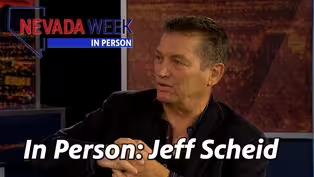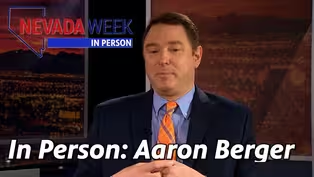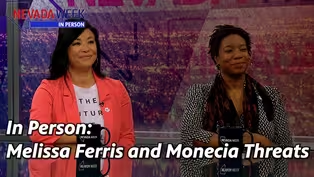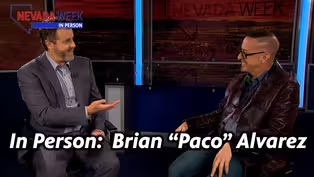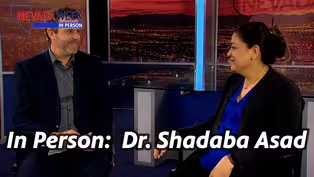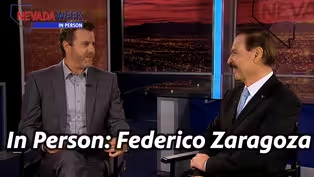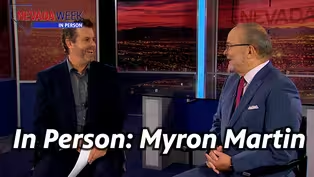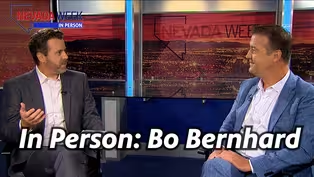
Nevada Week In Person | Richard Bryan
Season 1 Episode 7 | 14mVideo has Closed Captions
Retired Nevada Senator Richard Bryan talks about his life in service of the state.
We talk with former Nevada Senator Richard Bryan about his interest in history and historic preservation and his life in service to the people of Nevada.
Problems playing video? | Closed Captioning Feedback
Problems playing video? | Closed Captioning Feedback
Nevada Week In Person is a local public television program presented by Vegas PBS

Nevada Week In Person | Richard Bryan
Season 1 Episode 7 | 14mVideo has Closed Captions
We talk with former Nevada Senator Richard Bryan about his interest in history and historic preservation and his life in service to the people of Nevada.
Problems playing video? | Closed Captioning Feedback
How to Watch Nevada Week In Person
Nevada Week In Person is available to stream on pbs.org and the free PBS App, available on iPhone, Apple TV, Android TV, Android smartphones, Amazon Fire TV, Amazon Fire Tablet, Roku, Samsung Smart TV, and Vizio.
Providing Support for PBS.org
Learn Moreabout PBS online sponsorshipMore from This Collection
Nevada Week In Person goes beyond the roundtable discussion of Nevada Week with guests for a more casual conversation about their personal passions, new projects and compelling stories that are overlooked in the flurry of the news cycle.
Nevada Week In Person | Jeff Scheid
Video has Closed Captions
A one-on-one interview with longtime Southern Nevada photojournalist Jeff Scheid. (14m)
Nevada Week In Person | Aaron Berger
Video has Closed Captions
We talk with the executive director of the Neon Museum, Aaron Berger. (13m 59s)
Nevada Week In Person | Monecia Threats and Melissa Ferris
Video has Closed Captions
Monecia Threats and Melissa Ferris talk sports in Las Vegas. (14m)
Nevada Week In Person | Brian ‘Paco’ Alvarez
Video has Closed Captions
A personal interview with arts and culture curator Brian ‘Paco’ Alvarez. (14m)
Nevada Week In Person | Dr. Shadaba Asad
Video has Closed Captions
Infectious disease expert Dr. Shadaba Asad on the coronavirus pandemic. (14m)
Nevada Week In Person | Federico Zaragoza
Video has Closed Captions
An in-depth and personal conversation with CSN President Federico Zaragoza. (14m)
Nevada Week In Person | Myron Martin
Video has Closed Captions
An in-depth personal discussion with Smith Center CEO Myron Martin. (14m)
Nevada Week In Person | Bo Bernhard
Video has Closed Captions
An in-depth conversation with Bo Bernhard from UNLV about his work with the university. (14m)
Providing Support for PBS.org
Learn Moreabout PBS online sponsorshipRetired Senator Richard Bryan has served Nevada for decades, starting as a district attorney and all the way to the U.S. Senate.
Bryan worked for the people of the state of Nevada.
♪♪♪ Support for Nevada Week In Person is provided by Senator William H. Hernstadt and additional supporting sponsors.
(Kipp Ortenburger) There are a handful of people who worked in politics that can say they are admired and respected by both sides of the aisle.
Former Senator Richard Bryan falls into that category.
He started out as a deputy district attorney in Clark County in 1964, and from there he served in the state assembly and the state senate and as governor from 1983 to 1988, and from there he served two terms in the U.S. Senate where he authored and helped get passed a number of important pieces of legislation, including the vital Southern Nevada Public Land Management Act in 1998.
Senator Bryan, welcome.
We appreciate it.
-Delighted to be here with you.
-Yes, this is a little more of an intimate conversation than we had on the show, but I want to talk about the show a little bit because obviously, our focus was really on looking at history and how that history then of course is reflected in the situations we are in now.
But I want to come back to your interest in history.
The first time that I met you, I realized how in depth your knowledge of our local history is, and first off, where does that interest come from?
(Richard Bryan) Well, you know, your parents have an enormous influence on your life.
My father was in public life.
He sought elections on three different occasions, so that's kind of where I got the public service.
And what he used to say, and I've never heard anybody else use the term, he referred to every citizen, he used to say, has an obligation to pay his or her civic rent, and that means involvement in the community in that day.
My mother was a very proud Virginian, and one of my early books was Robert E. Lee: Boy of Old Virginia.
She was from Virginia, and that's where the passion in history began.
-What do you find most compelling about that history?
-Well, I find it interesting.
I'm interested in a wide range of history.
I don't know much about the history in South America other than, you know, the Conquistador period and, you know, the Spanish and then the Portuguese and what occurred during the 19th century when they got their individual independence.
But I think it's so instructive because it explains so much of why things are the way they are.
We were talking in your show about water.
We get out of Lake Mead 300,000 acre feet a year, California gets 4.4 million, even New Mexico gets 700.
So how could we have allowed that to occur?
We must really had bad representation.
No.
In point of fact, the state's population at that period of time was probably 50, 60, maybe 70,000 people.
I mean, there was no thought that Southern Nevada would ever need that much.
But there certainly was no legitimate argument to give it more water than say, Utah or New Mexico, so that context is helpful.
-And it's incredible to see what we've done with that water.
I mean, how it has then forced us to be extremely innovative, and something obviously you were very engaged in is having the political will to be able to move things forward so we're using water in the right way is an important part of this.
-And we've made progress on that.
I mean, the water challenge is out there, I don't want to minimize that, but clearly we're consuming less water today than we did a couple of decades ago, even though the population has grown by several 100,000.
Some of the things all your viewers will know, the one day of watering during the winter months, and three days in the fall and the spring and then six days during the summer, actually every day except Sunday.
So yes, but we're going to have to do more, and that's going to require some creativity, some political leadership and the will to do things.
The legislature for example in this past session earlier this year, the regular session, imposed some legislation, I think it goes into effect in 2026 which eliminates all, as they call it, nonfunctional grass.
That is to say, you know, parks, absolutely.
But if it's the entrance to a big hotel or so many of our gated communities, that grass is going to have to be replaced, and there are going to be people that don't like it.
My own view, it's not going to be as pretty but, I mean, as a practical matter, we've got to deal with this water issue because by every indication, it's not going to get better, it's going to get worse.
-It's going to get worse, and that also brings in it's not only of course the local issue and we're doing what we can, but it becomes so much more of a regional issue.
So that's why our relationships with of course Southern California, Arizona and even New Mexico and even the Upper Basin becomes so important, and it seems like we're doing the right things.
It seems like we're trying to be as collaborative as we can.
-I think we are.
I give Pat Mulroy who, you know, was-- I always referred to her as the "Water Czarina."
She was smart, tough, and she represented us extraordinarily well.
And I'm not suggesting in any way that her successor is not doing an outstanding job.
I don't.
But she was the lady on the Colorado River that knew just about as much as she can.
She was clearly a very formidable force for us.
-Yes.
I want to talk a little bit about historical preservation.
You are on many committees for both historical preservation here in Las Vegas but also statewide too.
This is a little bit of a conundrum I think for us that live here because we implode so much, we plow over so much, and then we regrow and we reinvent, which is what we talked about on the show.
But how good are we doing at preserving some of these pieces of history?
-Well, we could be doing better, but at least there's more focus on it now.
There's more focus, there's more discussion.
You know, the City of Las Vegas has the Centennial Commission, and it generates its revenue from the city license plates.
You know, the Las Vegas centennial plates that are still being sold.
That's an enormous source of revenue, and people who have a passion or interest-- you know, to buy one of those plates helps fund some of the activities that we create.
We provide funding for scholarship, people that want to do a study on some aspect of Las Vegas.
It's confined just to Las Vegas under the statute.
So we're doing better at that.
There is some recognition.
It is hard because Las Vegas is kind of-- the thing that makes it so dynamic is the energy level.
Let's do it.
You know, in other parts of the state, they like well, wait a minute.
That could create this problem.
You know, if the issue is there's a mountain in the way and there's some hyperbole, they level it, just take it away.
Hard charging, let's get it done type of thing.
That's very positive and has contributed enormously to the dynamic and the growth.
New people coming into the community are embraced if they have leadership qualities and interest in various organizations.
They're welcomed as opposed to saying well, after you've been here five or ten years, you might be considered for a board appointment.
That's just not the case.
But yeah, I think we're doing a little better in terms of preservation.
-It's not, and what a great segue to maybe talk a little about your political career, because by no means were you appointed to boards right away, but you did start as a deputy district attorney, public defender as we mentioned, and then you kind of followed-- I don't want to say traditional, but it was kind of a traditional trajectory, assembly, state senate, attorney general, governor and so on and so forth.
I would think that meant the learning curve was there to really understand how politics worked in the state, and then on Capitol Hill.
Did it?
-It did.
I mean, I was fortunate.
I love my experiences.
In fairness, there was not the polarization that we have today; I lament that.
Whether you're a Democrat, Republican, a progressive or far-right conservative, I mean, the inability to compromise, to have rational conversation is really a threat to our future.
Certainly some of that was emerging in the last couple years, but nothing like today.
When I went to the legislature initially, there wasn't even an organized caucus.
We met as Democrats and Republicans at the beginning of the year and assignments were given.
You're going to serve on judiciary, or you're going to serve on commerce or fish and game, whatever the committee was, and the caucus didn't have fundraisers.
When I decided to run for the assembly, same year that Harry Reid did, we didn't have to talk to anybody about it to be interviewed.
There was no caucus organization, and that meant when we got to Carson City, there was almost no partisanship.
I know that's hard to believe.
I mean, there were differences, north/south, those existed.
From the time I was in high school I was aware of that dynamic, and there were philosophical issues.
We debated some of the social issues.
Abortion was a big issue when I first came to the legislature in '69 and then later the ERA.
But it wasn't yours versus ours, and we could actually sit down and-- I remember the first day I walked on the floor.
I had been to the legislature, but I'd never, you know, followed the organization.
Howard McKissick, Republican, first Republican to control the state assembly since Herbert Hoover was in office in 1920, he stepped on the platform.
Dick, good to have you here, looking forward to working with you.
You're going to be sitting over here.
I mean, you wouldn't see that today at the national level, and frankly some of that virus has spread to the state as well.
-Well, it's interesting, and I want to come back to the Capitol Hill conversation too.
We had you on a show a few years ago, and you said something very, very interesting talking about the campaign finance aspect of this and how back in your era when campaigning was ramping up but it's not what it was today, everybody still lived on Capitol Hill, and you had Republicans and Democrats that were taking their kids to the same schools, you played baseball on the weekends.
-Yes.
There was some fairness, less of that by the time I got there, but that certainly-- you know, particularly before jet travel.
I mean, if you lived out West, I mean, McCarran came out very seldom, and it was a big deal when he came to town.
He didn't have an office down here.
One of his former staffers took the day off from work and drove him around.
But yes, that helped it seems to me, and some of that was still in existence.
In other words, we did a little socializing.
Bonnie and I came home most every week, but that helped.
And I had bipartisan support for so much of the legislation that I introduced, and some of which passed.
But it wasn't well, if you're a D, you can't be for this, or if you're an R, you can't be.
That's a different era, and it's not good for the country.
-It's not.
I mean, if we had to talk about the lowest hanging fruit as far as a solution, what would it be for you?
-I'm not sure I could-- first of all, I think I left at the right time.
I mean, I felt I could have been reelected, obviously that's up to the voters in Nevada, but I was seeing this growing partisanship.
Speaking of the campaign, for example, even after I announced that I was not going to run for reelection, and this had never occurred in the previous 11 years I was in the Senate, the expectation was as a Democrat to go over to the Democratic Senatorial Campaign Office, and we used to call it "dial for dollars," spend an hour or two calling prospective contributors.
Frankly, I didn't like that.
I never liked raising money.
I was scarred permanently when the Huntridge Theater opened in 1944.
The admission price for a child was 14 cents around town.
My mother gave me 14 cents.
My Lord, I learned it was going to cost 25 cents.
I spent from the last place in line up to the the booth where you get your tickets seeking a penny from as many people-- I raised 11 cents, and I hated it.
-We're out of time, Senator, but thank you.
It's such an important part.
Fundraising is fundraising when you're a kid all the way up to the level of Senator.
-Thank you so much; enjoyed visiting with you.
-Absolutely.
Well, to see an in-depth conversation with Senator Bryan and other historians about the reinvention of Las Vegas, go to our website, vegaspbs.org/nevadaweek or tune in on Sundays at 5:30 p.m. and Tuesdays at 7:30 p.m.
Thanks for joining us.
♪♪♪

- News and Public Affairs

Top journalists deliver compelling original analysis of the hour's headlines.

- News and Public Affairs

FRONTLINE is investigative journalism that questions, explains and changes our world.












Support for PBS provided by:
Nevada Week In Person is a local public television program presented by Vegas PBS
